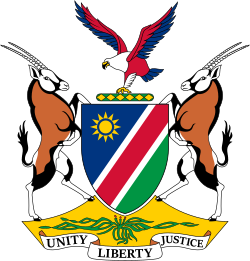5th National Assembly of Namibia | |
|---|---|
| Type | |
| Type | |
| History | |
| Founded | 2010 |
| Structure | |
| Seats | 78 |
 | |
Political groups | SWAPO (54) RDP (8) DTA (2) Others (8) Appointed (6) |
 |
|---|
Below is a list of members of the 5th National Assembly of Namibia. They were selected by their parties based on the results of the 2009 parliamentary election. The members were in the National Assembly from 21 March 2010 until 21 March 2015. Members were chosen by their parties. Parties were voted in via proportional representation.
Contents
- Elected members
- South West Africa People's Organization
- Rally for Democracy and Progress
- Democratic Turnhalle Alliance
- National Unity Democratic Organisation
- United Democratic Front
- All People's Party
- Republican Party
- Congress of Democrats
- South West Africa National Union
- Appointed members
- References
The 5th National Assembly consisted of 78 members: 72 elected from the party lists, and 6 without voting rights, appointed by the president. This National Assembly, like each of the previous National Assemblies, was led by the South West Africa People's Organization. The seat distribution for the voting members was as follows: [1]
- South West Africa People's Organization (SWAPO): 54
- Rally for Democracy and Progress (RDP): 8
- Democratic Turnhalle Alliance (DTA): 2
- National Unity Democratic Organisation (NUDO): 2
- United Democratic Front (UDF): 2
- All People's Party (APP): 1
- Republican Party (RP): 1
- Congress of Democrats (CoD): 1
- South West Africa National Union (SWANU): 1